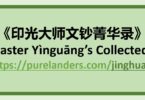
念佛利益多于诵经拜忏做水陆
[201] Mindfulness [Of] Buddha’s Benefits Surpass Those From Reciting Sūtras, Prostrating [With] Repentance, [And The] Water [And] Land [Dharma Assembly]
保病荐亡,今人率以诵经、拜忏、做水陆为事。光与知友言,皆令念佛。
[For] protecting [the] sick [and] delivering [the] deceased, people nowadays lead with reciting [of] sūtras, prostrating [with] repentance [prayers, and] conducting [of the] Water [And] Land [Dharma Assembly (水陆法会)] as practices. [Yìn]guāng for close friends say, [that] all [should be] enabled [to have] reciting [of Amitā(bha)] Buddha[‘s name] [Āmítuófó: 阿弥陀佛].
[Note 1: The Water And Land Dharma Assembly (水陆法会) is the most elaborate, lengthy and costly Dharma assembly in the Chinese Mahāyāna (大乘) tradition, which includes the recitation of many long sūtras. Although they include the Pure Land sūtras and mindfulness of the Buddha’s name (念佛), these, especially the latter, is not the Main Practice (正行), not with the most time and efforts focused upon. Although chanting of many sūtras creates much meritorious virtues (功德), without the Main Practice, the Buddha’s Pure Land (净土) cannot be reached.]
[Note 2: With mindfulness of the Buddha’s name, if there is already understanding of its purpose with guidance (开示) offered for both the living (i.e. the dying and support-chanters) and the deceased, all can easily practise it, mentally and/or verbally. Although this seems simple, the Buddha’s name is the Ten Thousand Virtues’ Great Name (万德洪名), which already encompass all meritorious virtues, for swift healing and the best rebirth in his Pure Land, when it is recited with the Three Provisions (三资粮) of Faith, Aspiration and Practice (信愿行): https://purelanders.com/2018/02/08/the-three-provisions.]
以念佛利益,多于诵经、拜忏、做水陆多多矣。何以故?诵经则不识字者不能诵,即识字而快如流水,稍钝之口舌,亦不能诵。懒坯虽能,亦不肯诵,则成有名无实矣。拜忏做水陆,亦可例推。
With mindfulness [of] Buddha’s benefits, [they are] more than [those from] reciting [of] sūtras, prostrating [with] repentance [prayers, and] conducting [of the] Water [And] Land [Dharma Assembly by] very much. Why is [this] thus? [With] reciting [of] sūtras, thus [are there] those [who do] not recognise [the] words, [who are] not able [to] recite [them]. Even if [they] recognise [the] words, yet [some recite as] quickly as flowing water, [while others with] slightly slower mouths [and] tongues, [are] also not able [to] recite [together. Those who are] lazy, although able [to recite, are] also not willing [to] recite, thus [with the reciting] becoming [that] existing [in] name [only], without true [benefits. For] prostrating [with] repentance [prayers and conducting [of the] Water [And] Land [Dharma Assembly, they can] also [with the above] examples [be similarly] inferred.
[Note 3: Many participants who wish to (or are obliged to) participate in reciting of sūtras do not recognise many words in them, what more to understand and recite them well, to create actual meritorious virtues. There might be misunderstanding and wrong chanting instead, which is surely not good. With only vague recognising and understanding of that recited, it is difficult to have wholehearted recitation to create meritorious virtues properly. While the learned and experienced can recite quickly, others not so will be distracted and disturbed to some extent.]
念佛则无一人不能念者。即懒坯不肯念,而大家一口同音念,彼不塞其耳,则一句佛号,固已历历明明灌于心中。虽不念,与念亦无异也。如染香人,身有香气。非特欲香,有不期然而然者。为亲眷保安荐亡者,皆不可不知。
[With] reciting [of the] Buddha[‘s name], thus [is it] without one person who [is] not able [to] recite [it]. Even if [those who are] lazy [are] not willing [to] recite, yet [with] everyone’s one voice together reciting, those [who do] not block their ears, [will] thus [have the] one line [of the] Buddha’s name, definitely then, distinctly [and] clearly, irrigating into [their] mind [fields (心田)] within. Although not reciting, with reciting, [these are] also without differences. Like persons perfumed [by] incense, [whose] bodies have fragrance. Not specially desiring [to have the] fragrance, having those not expecting thus, yet [having] thus. For relatives, [to] ensure peace [and to] deliver those deceased, all must not not know [this].
[Note 4: Even young children are able to follow everyone to recite the Buddha’s name sincerely. Even those too old and tired (or shy) to recite verbally can hear everyone’s recitation, thus with it registered in their minds. Even sincere listening to others’ recitation is a form of sincere personal recitation. The more there are practising sincerely together, the more meritorious virtues there will be, also offering more motivation for the dying and deceased to practise together. Thus, mindfulness of Buddha is definitely the easiest and most skilful means for guiding all to practise together, for direct and best results.]
[Note 5: Once the Buddha’s name is firmly planted in the mind field (心田), with it as an indestructible vajra seed (金刚种子), it will bear fruit with the right conditions sooner or later, leading to rebirth in the Buddha’s Pure Land.]
[Note 6: Synergising many factors of practice at once, mindfulness of Buddha can create meritorious virtues, express repentance with reverence, and offer guidance to reach Pure Land, encompassing all the benefits of the above practices. Even the Water And Land Dharma Assembly ultimately aims to deliver all beings to Pure Land, which guided mindfulness of Buddha already does directly.]
[Note 7: These reasons and more are why Great Master Yìnguāng taught as he did. As he wrote in One Letter As A Common Reply《一函遍复》: https://purelanders.com/yihan, ‘It must be known that when conducting Buddhist ceremonies (for delivering the deceased), only the meritorious virtues from mindfulness of Buddha are the most great.’ (须知做佛事,唯念佛功德最大。)]
净土宗十三祖印光大师
Pure Land Tradition’s 13th Patriarch Great Master Yìnguāng
《印光法师文钞》(正编):复黄涵之书;
Dharma Master Yìnguāng’s Collected Writings (First Compilation): Reply Letter [To] Huáng Hánzhī;
印光大师文钞菁华录(第两百零一则):四、论生死事大:丙、示临终切要(第十一则)
Record [Of] Great Master Yìnguāng’s Collected Writings’ Essence (201st Short Section): 4th [Chapter]: Discussion [On] Births’ [And] Deaths’ Great Matter: Third, Guidance [On When] Approaching [Life’s] End’s Definite Essentials (11th Short Section)
[Ref: #201 / 4.3.11]
Namo Amituofo : Translation and notes by Shen Shi’an
下一部分
Next Part:
丧礼全素,开示念佛
[202] Funerals Should Be Completely Vegetarian, With Guidance And Mindfulness Of Buddha
https://purelanders.com/2022/07/20/202-funerals-should-be-completely-vegetarian-with-guidance-and-mindfulness-of-buddha
上一部分
Previous Part:
以菩提心助念,功德更广大
[200] With The Bodhi Mind Support-Chanting, Meritorious Virtues Are Even More Vast
https://purelanders.com/2022/08/13/200-with-the-bodhi-mind-support-chanting-meritorious-virtues-are-even-more-vast
完整典籍
Complete Text:
《印光大师文钞菁华录》
Record Of Great Master Yìnguāng’s Collected Writings’ Essence
https://purelanders.com/jinghualu




